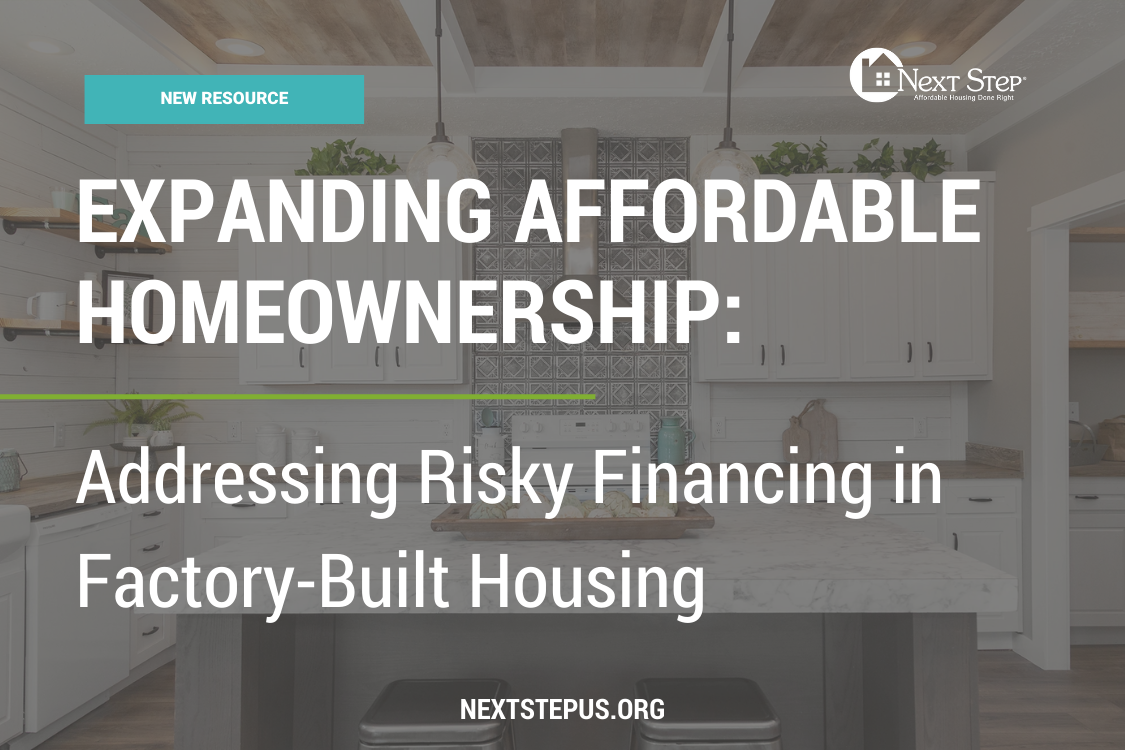Factory-built housing has long been a key source of affordable homeownership, particularly for low- and moderate-income families. However, a recent issue brief from The Pew Charitable Trusts highlights a concerning trend: 1 in 5 manufactured home borrowers rely on risky contract financing, often due to limited access to traditional mortgage options. These financing methods—such as rent-to-own agreements, chattel loans, and land contracts—frequently lack consumer protections, leading to higher costs and increased risk of home loss.
At Next Step, we work to ensure that factory-built homes are a sustainable path to homeownership by expanding access to better financing options. Thanks to advancements in factory construction and home design, today’s manufactured homes can qualify for affordable, conventional mortgage products through lenders like Fannie Mae, Freddie Mac, and the Federal Housing Administration (FHA)—offering buyers lower interest rates, longer loan terms, and stronger consumer protections.
The Link Between Financing and Homeownership Success
Pew’s research shows that many manufactured home buyers turn to alternative financing because they are unaware of or unable to access traditional mortgages. This limited awareness leads to costly outcomes: borrowers who use contract financing often face higher fees, lack of equity-building opportunities, and even eviction risks. Expanding the use of mortgage-backed loans for factory-built homes is critical to ensuring that homeownership remains an asset-building opportunity rather than a financial burden.
Fortunately, progress has been made in recent years. Programs like Freddie Mac’s CHOICEHome and Fannie Mae’s MH Advantage® provide site-built comparable financing options for qualifying factory-built homes. These loan products allow borrowers to access fixed-rate, 30-year mortgages with competitive interest rates, giving them the same financial stability as traditional home buyers.
However, the reach of these programs remains limited due to a lack of public awareness and lender participation. Many buyers and even housing professionals are unfamiliar with these improved financing solutions, leading to continued reliance on riskier options.
Expanding Awareness & Access to Better Financing
To reduce the use of risky contract financing and expand access to mortgage-backed loans, affordable housing professionals, policymakers, and industry leaders can take the following steps:
- Educate Homebuyers and Housing Professionals: Increased outreach efforts can help factory-built homebuyers understand their financing options. Nonprofits, lenders, and government agencies should work together to promote mortgage-backed loans tailored for factory-built homes.
- Expand Lender Participation: While Fannie Mae, Freddie Mac, and FHA provide financing options, many lenders remain hesitant to originate these loans. Encouraging more lenders to participate in manufactured home mortgage programs is essential to scaling access.
- Strengthen State and Federal Policy Support: Policymakers can help by expanding consumer protections for manufactured home buyers and increasing funding for down payment assistance programs that support the purchase of factory-built homes.
- Support Zoning and Regulatory Changes: Local governments should update zoning laws to recognize modern factory-built homes as permanent, high-quality housing eligible for traditional mortgage financing.
By promoting these solutions, we can help more families achieve stable, affordable homeownership through safe and sustainable financing options. Next Step is committed to ensuring that factory-built homes remain an affordable and equitable path to homeownership. Together, we can drive awareness and policy changes that support better financing for manufactured home buyers.
Interested in learning more?Explore how factory-built homes are transforming homeownership opportunities and how Next Step is leading the way in promoting sustainable housing solutions. Visit our website to find out more!
